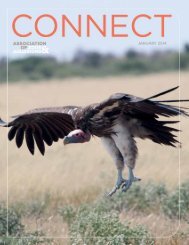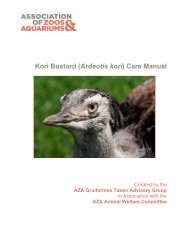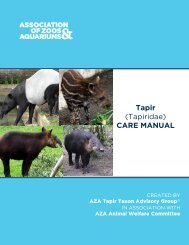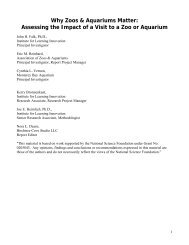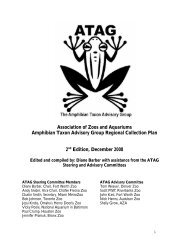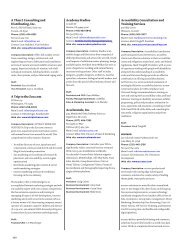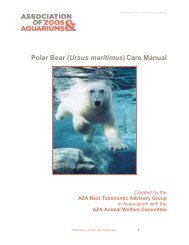Otter (Lutrinae) Care Manual - Association of Zoos and Aquariums
Otter (Lutrinae) Care Manual - Association of Zoos and Aquariums
Otter (Lutrinae) Care Manual - Association of Zoos and Aquariums
You also want an ePaper? Increase the reach of your titles
YUMPU automatically turns print PDFs into web optimized ePapers that Google loves.
10.1 Known Methodologies<br />
AZA believes that contemporary animal management,<br />
husb<strong>and</strong>ry, veterinary care <strong>and</strong> conservation practices should be<br />
based in science, <strong>and</strong> that a commitment to scientific research,<br />
both basic <strong>and</strong> applied, is a trademark <strong>of</strong> the modern zoological<br />
park <strong>and</strong> aquarium. AZA-accredited institutions have the<br />
invaluable opportunity, <strong>and</strong> are expected, to conduct or facilitate<br />
research both in in-situ <strong>and</strong> ex-situ settings to advance scientific<br />
knowledge <strong>of</strong> the animals in our care <strong>and</strong> enhance the<br />
conservation <strong>of</strong> wild populations. For otters, this knowledge might<br />
be achieved by AZA Small Carnivore Taxon Advisory Group<br />
<strong>Association</strong> <strong>of</strong> <strong>Zoos</strong> <strong>and</strong> <strong>Aquariums</strong> 87<br />
<strong>Otter</strong> (<strong>Lutrinae</strong>) <strong>Care</strong> <strong>Manual</strong><br />
Chapter 10. Research<br />
(TAG) or AZA <strong>Otter</strong> Species Survival Plan® (SSP) Program sponsored research, conducting original<br />
research projects, affiliating with local universities, <strong>and</strong>/or employing staff with scientific credentials (5.3).<br />
Research investigations, whether observational, behavioral, physiological, or genetically based,<br />
should have a clear scientific purpose with the reasonable expectation that they will increase our<br />
underst<strong>and</strong>ing <strong>of</strong> the otter species being investigated <strong>and</strong> may provide results which benefit the health or<br />
welfare <strong>of</strong> otters in wild populations. Many AZA-accredited institutions incorporate superior positive<br />
reinforcement training programs into their routine schedules to<br />
facilitate sensory, cognitive, <strong>and</strong> physiological research<br />
investigations <strong>and</strong> these types <strong>of</strong> programs are strongly<br />
encouraged by the AZA.<br />
AZA-accredited institutions are required to have a clearly<br />
written research policy that identifies the types <strong>of</strong> research being<br />
conducted, methods used, staff involved, evaluations <strong>of</strong> the<br />
projects, the animals included, <strong>and</strong> guidelines for the reporting or<br />
publication <strong>of</strong> any findings (5.2). Institutions must designate e a<br />
qualified individual designated to oversee <strong>and</strong> direct its research<br />
program (5.1). If institutions are not able to conduct in-house<br />
research investigations, they are strongly encouraged to provide<br />
financial, personnel, logistical, <strong>and</strong> other support for priority<br />
research <strong>and</strong> conservation initiatives identified by Taxon Advisory<br />
Groups or Species Survival Plans®.<br />
AZA Accreditation St<strong>and</strong>ard<br />
(5.3) Institutions should maximize the<br />
generation <strong>of</strong> scientific knowledge gained<br />
from the animal collection. This might be<br />
achieved by participating in AZA<br />
TAG/SSP sponsored research when<br />
applicable, conducting original research<br />
projects, affiliating with local universities,<br />
<strong>and</strong>/or employing staff with scientific<br />
credentials.<br />
AZA Accreditation St<strong>and</strong>ard<br />
(5.2) Institutions must have a written<br />
policy that outlines the type <strong>of</strong> research<br />
that it conducts, methods, staff<br />
involvement, evaluations, animals to be<br />
involved, <strong>and</strong> guidelines for publication <strong>of</strong><br />
findings.<br />
AZA Accreditation St<strong>and</strong>ard<br />
(5.1) Research activities must be under<br />
the direction <strong>of</strong> a person qualified to make<br />
informed decisions regarding research.<br />
The AZA <strong>Otter</strong> SSP, which falls under the Small Carnivore TAG, is the AZA entity tasked with<br />
recommending species for management by member institutions. The IUCN/SSC <strong>Otter</strong> Specialist Group<br />
(OSG) serves as an international focus <strong>of</strong> information sharing for these species. Information on current<br />
<strong>and</strong> past field work can be found at the OSG web site, www.otterspecialistgroup.org. Several universities<br />
(e.g. Frostburg State University, University <strong>of</strong> Wyoming) have pr<strong>of</strong>essors specializing in otter research.<br />
However, situations change <strong>and</strong> students interested in pursuing work with otters always should research<br />
current specialists working in the area <strong>and</strong> institutions with which they are affiliated. The AZA <strong>Otter</strong> SSP is<br />
compiling a list <strong>of</strong> institutions involved in or supporting otter research <strong>and</strong> conservation work. This<br />
information will become available in future versions <strong>of</strong> this document. For input on ongoing research or<br />
areas requiring further investigation please refer to the OSG web site or contact the AZA <strong>Otter</strong> SSP Chair.<br />
Effective Research Methodologies: All sound research approaches should be viable for use on otters,<br />
as long as they are not too invasive, require extensive surgery, or cause pain or discomfort. The following<br />
methodologies are routinely used by researchers looking at otters:<br />
• Behavioral observation<br />
• Latrine surveys<br />
• Fecal hormone analysis represents an invaluable tool for assessing the reproductive status <strong>of</strong><br />
individuals <strong>and</strong> populations in a completely noninvasive manner.<br />
• Fecal DNA analysis



